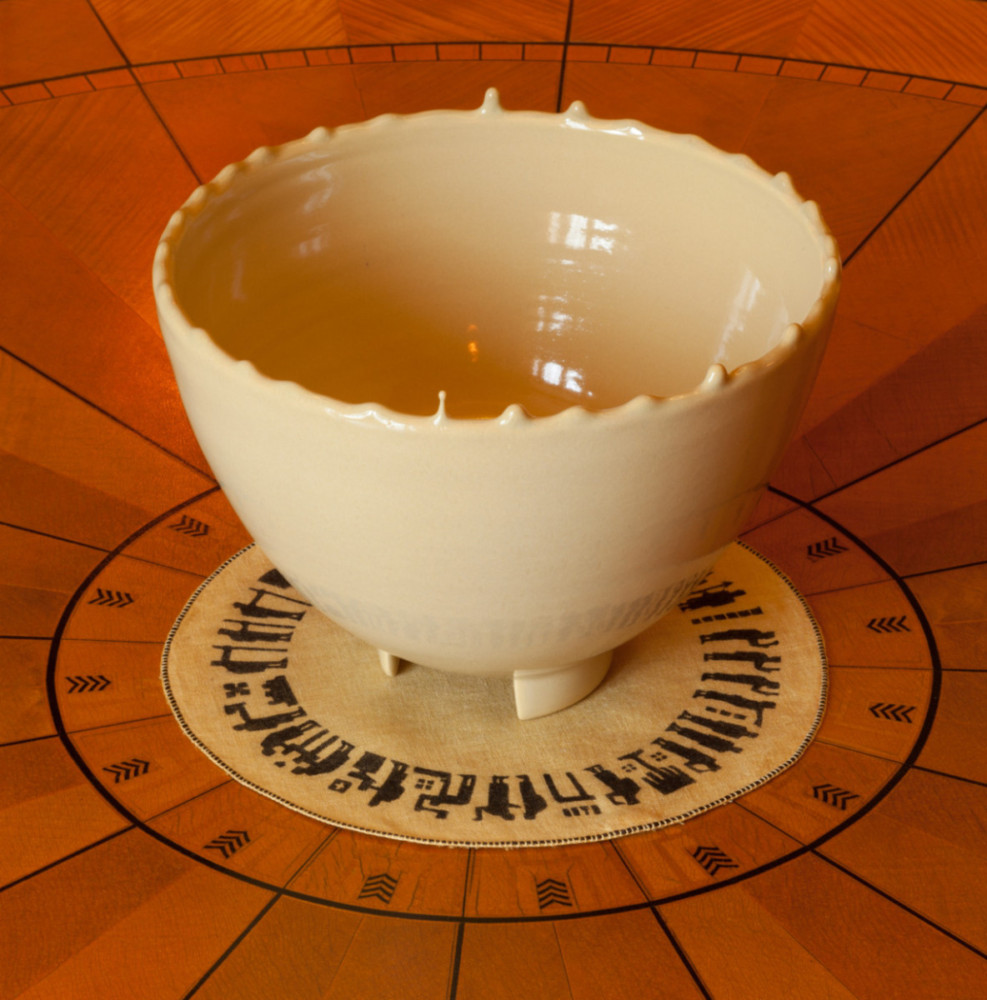If there is an impossible venue for site-specific art, it is the Saarinen House on the campus of the Cranbrook Academy of Art in Bloomfield Hills, Michigan. It’s known as a “total work of art” for a reason; the Finnish-American architect Eliel Saarinen attended to every inch of the house, down to the block printed linen placemats that are his design. However, for his first solo museum exhibition in North America, Danish ceramist Anders Ruhwald installed seven site-sensitive objects in the Saarinen House. The Anatomy of a Home (May 1 – October 31, 2013) explored the interpersonal relationships of the Saarinen family, including the father-son dynamic between Eliel and Eero Saarinen.
Designed in the late 1920s and located at the heart of Cranbrook Academy of Art, Saarinen House served as the home and studio of Eliel Saarinen and Loja Saarinen from 1930 through 1950. The extraordinary interior features the Saarinens’ original furnishings, including Eliel’s delicately-veneered furniture and Loja’s sumptuous textiles, as well as early furniture designs by their son Eero Saarinen. Eero became one of the most important architects and industrial designers of the mid-20th century, known for the TWA Flight Center at JFK, the St. Louis Arch, and iconic furniture such as the Tulip Chair.
According to Ruhwald:
The Saarinen House is an immensely loaded space. It was a model home and poster building for the Saarinens, but also served as the frame in which the son Eero grew up and spent his formative years working for his father. As such, the house becomes historically and psychologically charged-a place where work and life was presented as one. Through this intervention I have explored this dynamic and tried to make sense of a house in which the architecture and objects have become stand-ins for the life that was once lived there.
In the video below, Ruhwald takes the viewer through the house and his installation. One of the many fascinating things he points out, which is hard to decipher from the photographs, is that the five slab-like forms that he has placed in the second floor linen closet are each glazed a different, subtle variant of white. He comments that it’s an old trick to paint a linen closet a dark color (this one is a powerful blue) in order to make one’s linens look whiter. Ruhwald’s incisive interventions lead viewers to their own conclusions about how a boy that grew up there became a high modernist, devoting himself to the simplification of form, an absence of applied decoration, and, possibly, the color white.
Anders Ruhwald was born in Denmark, and educated at the Royal College of Art in London. He has received a number of international awards including a three-year work stipend from the Danish Art Foundation in 2010, the Sotheby Prize from the Victoria and Albert Museum in London in 2007 and the Gold Prize at the Icheon World Ceramic Center in South Korea in 2012. Ruhwald was appointed Artist-in-Residence and Head of the Ceramics Department at Cranbrook Academy of Art in 2008. For the last ten years, Ruhwald has enjoyed an active international exhibition career that has spanned Europe, Africa, Asia and North America. His work has been represented in leading international public collections including the Victoria and Albert Museum in London, the National Museum of Sweden and The Detroit Institute of Arts. He has won critical acclaim for his conceptual work that explores the boundaries of the ceramic medium as an idea and a material.
Amy Albracht is the General Editor at CFile.
Image above: Anders Ruhwald, Bowl – For a Timeless House, Glazed earthenware, 8-1/2 x 11-1/2 x 11-1/2 inches, 2012 and Placemat by Eero Saarinen, Block printed linen, ca. 1920, Dining Room, Saarinen House. Image courtesy of Anders Ruhwald.

Saarinen House Exterior, Cranbrook Art Museum, Bloomfield Hills, MI, USA

Dining Room, Saarinen House with Bowl – For a Timeless House, Anders Ruhwald

Studio and Studio Alcove, Saarinen House with Crystal Ball (The Future), Anders Ruhwald


Anders Ruhwald, Crystal Ball (The Future). Glazed earthenware and crystal ball, 21-5/8 x 16-1/4 x 16 inches, 2012 – Studio Alcove



Second floor hallway, Saarinen House and Fade to White, Anders Ruhwald. Glazed Earthenware, 2-5/8 x 13-3/4 x 11-1/8 inches (each of five components), 2012 – Second floor hallway linen closet.


Master bedroom and The School of the Flower, Anders Ruhwald. Glazed earthenware and steel, 36-7/8 x 68 x 20 inches, 2012 – Master bathroom, Saarinen House. All photographs by Anders Ruhwald.
Anders Ruhwald: The Anatomy of a Home, 2013. Film by the Louisiana Channel for the Louisiana Museum of Modern Art in Humlebæk, Denmark.
Visit the Cranbrook Art Museum
Visit Eero Saarinen at the Architecture + Design Museum Los Angeles, CA

Add your valued opinion to this post.